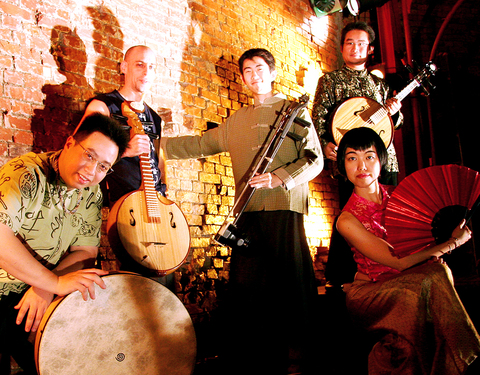Scott Prairie considers himself a spiritually oriented person — and maybe for good reason.
Fifteen years ago in New York, he took an electric Fender Precision bass, removed one string, and tuned the remaining three strings to GDG. He used the instrument to write songs and try to get signed by a record label. What he didn't realize at the time was that his modified P-bass sounded a lot like some traditional Asian instruments he would encounter after he bumped into Mia Hsieh (謝韻雅), married her, moved to Taiwan, and started a world music group with her called A Moving Sound.
"It's like there's some element of fate," said Prairie, as he described the similarities between his three-stringed bass and the zhongruan (中阮), or "moon guitar," a four-stringed Chinese lute tuned GDGD. "I was really drawn to this kind of simple, open-tuning system. And then I found this instrument in Taiwan that looked exactly like it."

PHOTO: COURTESY OF A MOVING SOUND
Taiwan has been good to Prairie, whose group plays The Wall next Friday. Both of A Moving Sound's albums — 2004's Pacu's Trip and last year's Songs Beyond Words — have been well-received by local critics. Eslite Reader (誠品好讀雜誌) magazine just named Songs Beyond Words one of the year's best in the world music category, and the album was nominated for a Golden Melody award.
More important, the government has sponsored concerts outside of Taiwan, and the group has been featured on the BBC World Service and National Geographic's Web site. A Moving Sound played the New York City theater where Elvis Costello recently did a concert with Roseanne Cash. Foreign critics have called the group "one of the most original outfits working in the world music arena today" (Nationalgeographic.com); and "delicately balanced between many worlds" ... an "artful expression of the universal human condition" (Globalrhythm.net). With the exception of one-off recordings of traditional Aboriginal music, this is the best attention a world music group from Taiwan has received in recent years.
One of the more interesting pieces on Songs Beyond Words is Ku Chin (東風), which was inspired by the guqin (古琴), an ancient Chinese stringed instrument that sounds a bit like a modern slide guitar or pizzicato cello. Prairie plays the zhonruan on some songs, but he uses his P-bass for Ku Chin.
"The guqin was used originally not for performance but for meditation," Prairie explained, "It's very internal and very spacey, but it's also a deep part of Chinese history." He tries to evoke both elements in the song. "I do a lot of harmonics and tapping and sliding," he said, "because that's what they do when they play the guqin."
"It's a very unique way of using the bass," he noted.
Once Prairie composed his part of Ku Chin, he turned the song over to Hsieh. "What Mia did was really cool," he said, "she totally went outside and ... created a melody based on the classical Chinese opera style called nanguan (南管)."
"That's how we work together. I create something that has a narrative and all these different ways of being inspired, and then I throw it at her and she completely has her own creative experience with it," he said. "Her main influences are not even music. They're theater and dance. She's very into the story and into the movement."
Ku Chin is a good example of what critics mean when they call A Moving Sound a delicate balance of East and West. On one side stands Hsieh's singing, an ancient poem in an old dialect that modern Taiwanese cannot understand, along with an erhu (二胡) that overlaps with her voice and then goes solo. On the other there's Prairie's modified Fender, which plays an Asian melody but with a rock 'n' roll sensibility, as if Lou Barlow were meditating on an electric bass.
It's a mix that, so far, has earned more fans abroad than in Taiwan. Prairie said A Moving Sound's local distributor, Jingo, has sold 150 units of Songs Beyond Words. The group has sold 600 to 700 more CDs at concerts. "We have two lives," Prairie said, "One is Taiwan, and the other is international. They're very different ... . Sometimes it's most difficult to get recognition in your own backyard."

Not long into Mistress Dispeller, a quietly jaw-dropping new documentary from director Elizabeth Lo, the film’s eponymous character lays out her thesis for ridding marriages of troublesome extra lovers. “When someone becomes a mistress,” she says, “it’s because they feel they don’t deserve complete love. She’s the one who needs our help the most.” Wang Zhenxi, a mistress dispeller based in north-central China’s Henan province, is one of a growing number of self-styled professionals who earn a living by intervening in people’s marriages — to “dispel” them of intruders. “I was looking for a love story set in China,” says Lo,

In the next few months tough decisions will need to be made by the Taiwan People’s Party (TPP) and their pan-blue allies in the Chinese Nationalist Party (KMT). It will reveal just how real their alliance is with actual power at stake. Party founder Ko Wen-je (柯文哲) faced these tough questions, which we explored in part one of this series, “Ko Wen-je, the KMT’s prickly ally,” (Aug. 16, page 12). Ko was open to cooperation, but on his terms. He openly fretted about being “swallowed up” by the KMT, and was keenly aware of the experience of the People’s First Party

It was on his honeymoon in Kuala Lumpur, looking out of his hotel window at the silvery points of the world’s tallest twin skyscrapers, that Frank decided it was time to become taller. He had recently confessed to his new wife how much his height had bothered him since he was a teenager. As a man dedicated to self-improvement, Frank wanted to take action. He picked up the phone, called a clinic in Turkey that specializes in leg lengthening surgery — and made a booking. “I had a lot of second thoughts — at the end of the day, someone’s going

Aug. 25 to Aug. 31 Although Mr. Lin (林) had been married to his Japanese wife for a decade, their union was never legally recognized — and even their daughter was officially deemed illegitimate. During the first half of Japanese rule in Taiwan, only marriages between Japanese men and Taiwanese women were valid, unless the Taiwanese husband formally joined a Japanese household. In 1920, Lin took his frustrations directly to the Ministry of Home Affairs: “Since Japan took possession of Taiwan, we have obeyed the government’s directives and committed ourselves to breaking old Qing-era customs. Yet ... our marriages remain unrecognized,